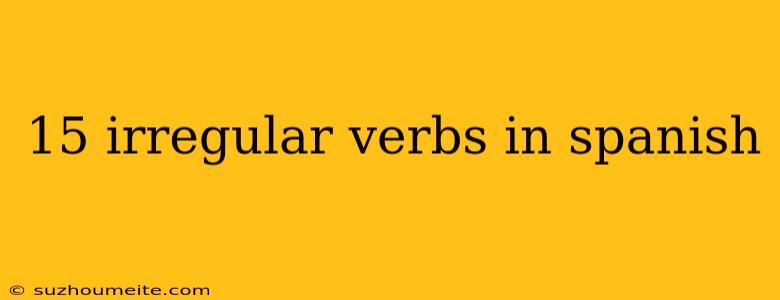15 Irregular Verbs in Spanish
Introduction
Irregular verbs in Spanish can be challenging for language learners, as they don't follow the usual conjugation patterns of regular verbs. However, mastering these irregular verbs is essential to improve your Spanish language skills. In this article, we will explore 15 common irregular verbs in Spanish, their conjugations, and examples of how to use them in sentences.
1. Ser (to be)
- Present tense: soy (I am), eres (you are), es (he/she/it is), somos (we are), sois (you all are), son (they are)
- Preterite tense: fui (I was), fuiste (you were), fue (he/she/it was), fuimos (we were), fuisteis (you all were), fueron (they were)
Example sentence: Soy estudiante. (I am a student.)
2. Estar (to be)
- Present tense: estoy (I am), estás (you are), está (he/she/it is), estamos (we are), estáis (you all are), están (they are)
- Preterite tense: estuve (I was), estuviste (you were), estuvo (he/she/it was), estuvimos (we were), estuvisteis (you all were), estuvieron (they were)
Example sentence: Estoy cansado. (I am tired.)
3. Tener (to have)
- Present tense: tengo (I have), tienes (you have), tiene (he/she/it has), tenemos (we have), tenéis (you all have), tienen (they have)
- Preterite tense: tuve (I had), tuviste (you had), tuvo (he/she/it had), tuvimos (we had), tuvisteis (you all had), tuvieron (they had)
Example sentence: Tengo un perro. (I have a dog.)
4. Querer (to want)
- Present tense: quiero (I want), quieres (you want), quiere (he/she/it wants), queremos (we want), queréis (you all want), quieren (they want)
- Preterite tense: quise (I wanted), quisiste (you wanted), quiso (he/she/it wanted), quisimos (we wanted), quisisteis (you all wanted), quisieron (they wanted)
Example sentence: Quiero ir al cine. (I want to go to the movies.)
5. Poder (to be able to)
- Present tense: puedo (I can), puedes (you can), puede (he/she/it can), podemos (we can), podéis (you all can), pueden (they can)
- Preterite tense: pude (I could), pudiste (you could), pudo (he/she/it could), pudimos (we could), pudisteis (you all could), pudieron (they could)
Example sentence: Puedo hablar español. (I can speak Spanish.)
6. Hacer (to do/to make)
- Present tense: hago (I do), haces (you do), hace (he/she/it does), hacemos (we do), hacéis (you all do), hacen (they do)
- Preterite tense: hice (I did), hiciste (you did), hizo (he/she/it did), hicimos (we did), hicisteis (you all did), hicieron (they did)
Example sentence: Hago ejercicio todos los días. (I exercise every day.)
7. Decir (to say)
- Present tense: digo (I say), dices (you say), dice (he/she/it says), decimos (we say), decís (you all say), dicen (they say)
- Preterite tense: dije (I said), dijiste (you said), dijo (he/she/it said), dijimos (we said), dijisteis (you all said), dijeron (they said)
Example sentence: Digo la verdad. (I tell the truth.)
8. Ir (to go)
- Present tense: voy (I go), vas (you go), va (he/she/it goes), vamos (we go), vais (you all go), van (they go)
- Preterite tense: fui (I went), fuiste (you went), fue (he/she/it went), fuimos (we went), fuisteis (you all went), fueron (they went)
Example sentence: Voy al parque. (I am going to the park.)
**9.
